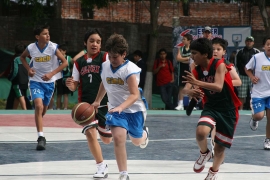Although in Don Bosco's days sport was not part of the culture of the time, the courtyard or playground was the essential place to stay with young people and educate them. "The playing field was an essential element in its educational system," wrote José J. Palacios, SDB, "because in this physical environment games and joy are developed, physical activity is increased, friendly relations among peers are established, children and young people express themselves spontaneously and the relationship between educator and educating are consolidated... "
Thanks to its widespread appeal, its unequaled popularity and the positive values on which it is based, sport occupies a prominent place in the contribution to the development and to the peace goals of the UN.
The 2030 Agenda for Sustainable Development recognizes the role of sport in social progress as "an important facilitator of sustainable development. We recognize the growing contribution of sport to development and to peace in terms of promoting tolerance and respect, the emancipation of women and young people, both individually and at the community level, as well as health, education and social inclusion."
The General Assembly of the United Nations instituted the Day of April 6 to raise awareness on the role that sport can play in the promotion of Human Rights and economic and social development.
In the world of education there is a saying: "if you want to know and educate a young person, (get to) know them in the playground and in the dining room." These are the places where young people show themselves as they are and places to intervene pedagogically to educate them to sacrifice, to work, in the spirit of improvement, in the search for solutions, in the acceptance of rules, the respect of authority, in the sense of belonging to a team, in knowing how to accept defeat ...


